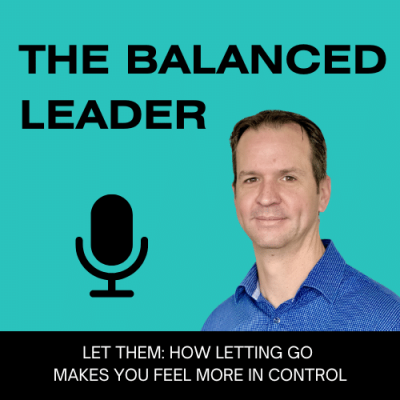In this episode of The Balanced Leader Podcast, I explore the power of letting go and shifting focus from controlling others to managing our own responses. We introduce the Let Them Theory, popularised by Mel Robins, which helps leaders reduce stress, navigate challenges, and create more balance in their lives.
By embracing this approach, leaders can build resilience, improve relationships, and focus on what truly matters. To wrap up the episode I challenge listeners to reflect on where they can release control and take ownership of their own actions, offering a fresh perspective on leadership and wellbeing.
Chapters
00:00:07 Welcome Back
00:01:40 Introducing the Let Them Theory
00:02:21 Let Them: Releasing Control
00:03:14 Let Me:Taking Ownership
00:04:43 Key Quotes from the Book & Insights
00:09:18 Challenge for Listeners & Wrap-Up

[00:00:00] Welcome to The Balanced Leader podcast. Where we tackle the ultimate challenge for leaders, achieving peak performance without sacrificing your wellbeing. If you’re ready to lead with clarity, energy, and impact without burning out, then you’re in the right place. I’m Rob Hills, your leadership and wellbeing coach, and in each episode, I’ll give you the insights, tools, and strategies that will enable you to thrive.
[00:00:29] So let’s dive into today’s episode. First of all, welcome back. This is the first episode of 2025, and I’m excited to be back behind the mic and ready for the year ahead. You may remember from the last episode that I talked about the importance of breaks and really disconnecting from work. One of the great things about this podcast is it really holds me accountable when I say things like that, because I have this little voice inside my head.
[00:00:54] saying, well, now you have to do it. So in that spirit, I did no work from Christmas Eve right through until the 6th of January. And it made a huge difference. I’m a bit of an A type personality, constantly doing things. So really slowing down. I didn’t check my work emails. I didn’t work on the podcast. I didn’t do anything work related at all, really.
[00:01:16] And it felt amazing. I physically noticed the stress in my body reduce further and further as the days went on. So I hope you also heeded my advice and had a relaxing and restorative break as well. I love to read. So one of the things I did do over my holidays is I read a couple of books and one that really stood out for me and has made a huge impact on my way of thinking already is Let Them by Mel Robbins.
[00:01:44] I have already recommended this book to several people, but when I thought about the potential impact it could have on people’s lives, I really wanted to talk about on the podcast as well. It’s a pretty simple concept. And to be honest, it’s one that’s been around for thousands of years. In fact, you’ll find it in all sorts of ancient wisdom, but if you could really grasp its potential, it could be life changing for you too.
[00:02:07] The let them theory is basically a mindset shift that helps people let go of unnecessary stress. and focus on what truly matters. It’s based on two key parts. The first one is let them. This part is about releasing control over other people’s choices, opinions, or behaviors. Instead of trying to change or manage other people, you simply let them do whatever it is they’re doing.
[00:02:33] And by letting go of control and not worrying about their reactions, we’re going to be less frustrated and worried about something that’s already out of our control anyway. So here are a couple of examples. If someone doesn’t invite you to an event, maybe it’s a party, let them. If a co worker takes credit for an idea, let them.
[00:02:53] If a decision at work doesn’t go your way, let them. Now, I know you might be listening to this and go, yeah, but that’s probably not as easy as it sounds. It’s not without its challenges. You have to work at this, but I think the end results really are worth striving for. The second part of the theory is let me.
[00:03:14] And this part shifts the focus back to you. It’s about deciding how you want to show up, what you want to prioritize and how you want to respond. So instead of being reactive, you take responsibility for your own actions and mindset. So let’s go back to those examples from before. So someone doesn’t invite you to an event.
[00:03:33] Let them. And let me. Figure out my part in this. Let me prioritize my friendships. Maybe I haven’t been prioritizing them lately. Let me organize the next event. Let me be a little bit more proactive. Let me be a better friend. The next example was if a coworker takes credit for an idea. Let them. And, let me focus on consistently adding value, knowing that my contributions will be recognized over time.
[00:04:01] Let me speak up more publicly about my great ideas. Let me reflect on whether this is a one time issue or a pattern that might need addressing. And the last example was, if a decision at work doesn’t go your way, let them. And, let me stay professional and adaptable, even if I disagree. Let me focus on what I can influence, instead of resisting what I can’t.
[00:04:25] And maybe let me seek to understand the reasoning behind the decision. When you say, let me, you’re taking responsibility for what you do next, but you aren’t holding onto what has already happened. When I read a book, I always highlight the key parts. So what I want to do next is just read out a couple of my favorite parts, the real mic drop moments.
[00:04:46] Okay. First one, you’ve been trying to control the uncontrollable. Trying to force the world to conform to your expectations. But what if, instead, you focused on your own response to whatever the world throws your way? You can’t change the weather, but you can change how it impacts you. And this quote really reminds me of the Jon Kabat Zinn quote.
[00:05:07] You can’t control the waves, but you can learn to surf. And that’s really one of my favorites when it comes to mindfulness. But there’s always going to be something, right? Life always has a habit of throwing challenges our way, even on a daily basis. But we don’t have to take the hook. We can see the bait on the hook, we can know where it’s going to lead to, and we can choose not to bite.
[00:05:28] And there’s another quote there, um, from Viktor Frankl. In between stimulus and response lies our freedom to choose. And that’s where our power is. So we get to choose not to engage. And the last thing I’ll say, and this is going a little bit deeper into the psychology here, but nothing in life is a problem until we assign meaning to it.
[00:05:49] So events happen, but they don’t really mean anything until we, you know, the human, decide to do something with that. And we are meaning making machines. We’re constantly assigning meaning to stuff. But what if we didn’t do that? A lot of the book talks about control and by worrying about other people that we’re trying to control them and the situation.
[00:06:11] And I can really relate to that because I hate the feeling of letting people down or if people are angry at me or dislike me or whatever. So I’m constantly trying to control the situation. I’m worrying about other people’s reactions and whether I’m meeting their expectations. It is exhausting. So this is why I think this particularly resonates with me.
[00:06:32] Here’s another quote. The fact is none of that control actually makes you feel better. In fact, it has the opposite effect. Trying to control people in situation doesn’t calm your fears. It amplifies them. Any psychologist will tell you the more you try to control something you can’t, the more anxious and stressed out you become.
[00:06:52] Which is weird, right? Because when you worry, you kind of think you’re solving a problem. Otherwise you wouldn’t do it. Like it’s actually counterproductive. But intuitively, it’s not. That’s what we’re doing. We’re worrying about it and we’re causing more angst for ourselves. We think that somehow we can worry ourselves out of a situation, and in most cases we can’t.
[00:07:12] So this one totally resonates with me, which is why let them, uh, two words, I need to get tattooed on my forearm. And a side note here, when you do read the book, you’ll see that’s exactly what hundreds of people have actually done. They’ve literally tattooed let them on their body to remind them. That’s weird.
[00:07:29] Okay. No judgment. Okay, here’s the final quote. The most important part of the Let Them Theory is understanding that you are responsible for your own happiness. You are responsible for the energy you bring and how you show up. You are responsible for waking up every day and doing the work to make progress on what matters.
[00:07:49] You are responsible for defining what matters to you. Which is so true. We don’t have control over the external. We can’t change other people. All we can do is change ourselves, and we absolutely have control over what’s happening inside of us. I’m not saying it’s easy, this, I’m a work in progress, but I think we can do it.
[00:08:10] And for me, probably the biggest irony of this entire situation, is the fact that most of the time people aren’t worried about you anyway. They’re not even thinking about you. They’re all caught up in their own stuff. So we’re worrying about what they’re worrying about. Meanwhile, they’re worrying about something completely different.
[00:08:28] They’re not worried about us at all. However, in our mind, we’ve created a narrative that we have somehow offended them or impacted them in a way that has left them annoyed or angry. And sure, maybe in that first instance, they were annoyed, but they’ve probably moved on. But that doesn’t change the meaning we assign to it and how it makes us feel.
[00:08:47] And this reminds me of a Mark Twain quote, I’ve lived through some terrible things in my life. Some of them actually happened. That one still cuts too close to the bone. So for me, I think the let them theory is a game changer, not just for leaders, but for anyone who feels overwhelmed by the need to manage everything and control everyone in their lives.
[00:09:09] So I really encourage you to go out and buy it today. You won’t regret it. So, as we wrap up this episode, I want you to think about one situation or relationship where you can say, let them. See how it feels to release control. Might feel a little bit weird at first, but you’ll get the hang of it. How might this change your life if you just loosen the grip a little bit and not take on other people’s issues?
[00:09:35] And don’t forget the second part, let me, what can I do moving forward? What’s my part of the mess and what can I do proactively to make sure this doesn’t come up again? I hope you’ve enjoyed this episode and found it useful. If you haven’t already make sure you follow the show and leave us a review on the platform you’re currently listening to.
[00:09:56] Enjoy the rest of your day. And I’ll speak to you next time.
